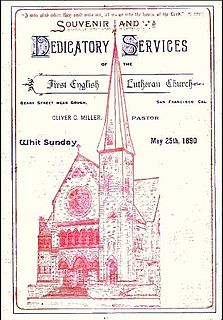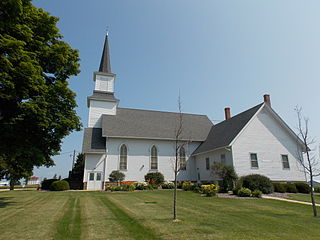The Evangelical Lutheran Church in America (ELCA) is a mainline Protestant Lutheran church headquartered in Chicago, Illinois. The ELCA was officially formed on January 1, 1988, by the merging of three Lutheran church bodies. As of 2019, it has approximately 3.3 million baptized members in 8,972 congregations.

The Wisconsin Evangelical Lutheran Synod (WELS), also referred to simply as the Wisconsin Synod, is an American Confessional Lutheran denomination of Christianity. Characterized as theologically conservative, it was founded in 1850 in Milwaukee, Wisconsin.
The Confessing Movement is a lay-led conservative Christian movement that opposes the influence of liberalism and progressivism within several mainline Protestant denominations and seeks to return them to its view of orthodox doctrine.

Seminex is the widely used abbreviation for Concordia Seminary in Exile that existed from 1974 to 1987 after a schism in the Lutheran Church–Missouri Synod (LCMS). The seminary in exile was formed due to the ongoing Fundamentalist–Modernist Controversy that was dividing Protestant churches in the United States. At issue were foundational disagreements on the authority of Scripture and the role of Christianity. During the 1960s, the LCMS church laity grew concerned about the direction of education at their flagship seminary, Concordia Seminary. Professors at Concordia Seminary had, in the 1950s and 1960s, begun to utilize the historical-critical method to analyze the Bible rather than the traditional historical-grammatical method that considered scripture to be the inerrant Word of God.
The Synod of the Norwegian Evangelical Lutheran Church in America, commonly called the Norwegian Synod, was founded in 1853. It included churches in Illinois, Iowa, Minnesota, and Wisconsin.

Mark S. Hanson is an American bishop who served as the third Presiding Bishop of the Evangelical Lutheran Church in America. Before being elected presiding bishop, he served as bishop of the Saint Paul Area Synod as well as pastor of three Minnesota congregations: Prince of Glory Lutheran Church, Minneapolis; Edina Community Lutheran Church; and University Lutheran Church of Hope in Minneapolis. In addition to serving as Presiding Bishop, Hanson was the 11th President of the Lutheran World Federation.

The American Lutheran Church (TALC) was a Christian Protestant denomination in the United States and Canada that existed from 1960 to 1987. Its headquarters were in Minneapolis, Minnesota. Upon its formation in 1960, The ALC designated Augsburg Publishing House, also located in Minneapolis, as the church publisher. The Lutheran Standard was the official magazine of The ALC.
The Association of Evangelical Lutheran Churches (AELC) was a U.S. church body that existed from 1976 through the end of 1987. The AELC formed when approximately 250 dissident congregations withdrew from the Lutheran Church–Missouri Synod (LCMS) in 1976, and ended as an independent body when it became part of the new Evangelical Lutheran Church in America (ELCA) on January 1, 1988.
ReconcilingWorks, initially named Lutherans Concerned for Gay People and subsequently Lutherans Concerned/North America, is an organization of laypeople, pastors, and congregations primarily from the Evangelical Lutheran Church in America (ELCA) and the Evangelical Lutheran Church in Canada (ELCIC), that is working for the full acceptance and inclusion of people of all sexual orientations and gender identities and expressions in the life of the Church. It is one of many LGBT-welcoming church movements to emerge in American Christianity in the late 20th century. ReconcilingWorks's mission statement reads: "Working at the intersection of oppressions, ReconcilingWorks embodies, inspires, advocates and organizes for the acceptance and full participation of people of all sexual orientations and gender identities within the Lutheran communion and its ecumenical and global partners."

The Lutheran Ministerium and Synod – USA (LMS-USA) is a small Lutheran Christian denomination based in the United States. Its congregations are mostly located in the Upper Midwest, and the church body maintains its official headquarters in Indianapolis, Indiana.
The Lutheran Church in America (LCA) was an American and Canadian Lutheran church body that existed from 1962 to 1987. It was headquartered in New York City and its publishing house was Fortress Press.
WordAlone is a Lutheran grassroots network of congregations and individuals within the Evangelical Lutheran Church in America (ELCA), the largest Lutheran denomination in the United States. According to its website, WordAlone advocates reform and renewal of the church, representative governance, theological integrity, and freedom from a mandated historic episcopate. The group is generally considered theologically and socially conservative. As of 2005, approximately 215 congregations have officially joined the organization.

The Evangelical Lutheran Synodical Conference of North America, often known simply as the Synodical Conference, was an association of Lutheran synods that professed a complete adherence to the Lutheran Confessions and doctrinal unity with each other. Founded in 1872, its membership fluctuated as various synods joined and left it. Due to doctrinal disagreements with the Lutheran Church–Missouri Synod (LCMS), the Evangelical Lutheran Synod (ELS) and the Wisconsin Evangelical Lutheran Synod (WELS) left the conference in 1963. It was dissolved in 1967 and the other remaining member, the Synod of Evangelical Lutheran Churches, merged into the LCMS in 1971.

First United Lutheran Church is a congregation of the Evangelical Lutheran Church in America (ELCA), located in San Francisco, California. Formed in 1886, it was the first Lutheran congregation in California to use English as its primary language for worship. In 1990, First United was suspended, and later expelled from the ELCA for ordaining an openly gay pastor, against the wishes of the denomination. The ELCA Churchwide Assembly voted to approve openly gay clergy in 2009, and in 2012, First United rejoined the denomination. Presently a "church without walls," First United meets in St. Cyprian's Episcopal Church, located at 2097 Turk Street, near the main campus of the University of San Francisco.
The 2009 ELCA Churchwide Assembly was the eleventh biennial Churchwide Assembly of the Evangelical Lutheran Church in America. It convened in the city of Minneapolis, Minnesota, from August 17–23, 2009. The Churchwide Assembly is the 'highest legislative authority' of the ELCA.
The Evangelical Lutheran Joint Synod of Ohio and Other States, commonly known as the Joint Synod of Ohio or the Ohio Synod, was a German-language Lutheran denomination whose congregations were originally located primarily in the U.S. state of Ohio, later expanding to most parts of the United States. The synod was formed on September 14, 1818, and adopted the name Evangelical Lutheran Joint Synod of Ohio and Other States by about 1850. It used that name or slight variants until it merged with the Iowa Synod and the Buffalo Synod in 1930 to form the first American Lutheran Church (ALC), 1930–1960.

Our Savior's Kvindherred Lutheran Church is an Evangelical Lutheran Church in America congregation located near the town of Calamus in rural Clinton County, Iowa, United States. The church and former school buildings as well as the church cemetery were listed as an historic district on the National Register of Historic Places in 2000.

Immanuel Lutheran Church is an LCMS church in Perryville, Missouri.
David Walter Preus was an American Lutheran minister. He served as the last president/presiding bishop of the American Lutheran Church (ALC) from 1973 until that body merged into the Evangelical Lutheran Church in America (ELCA) in 1988.













